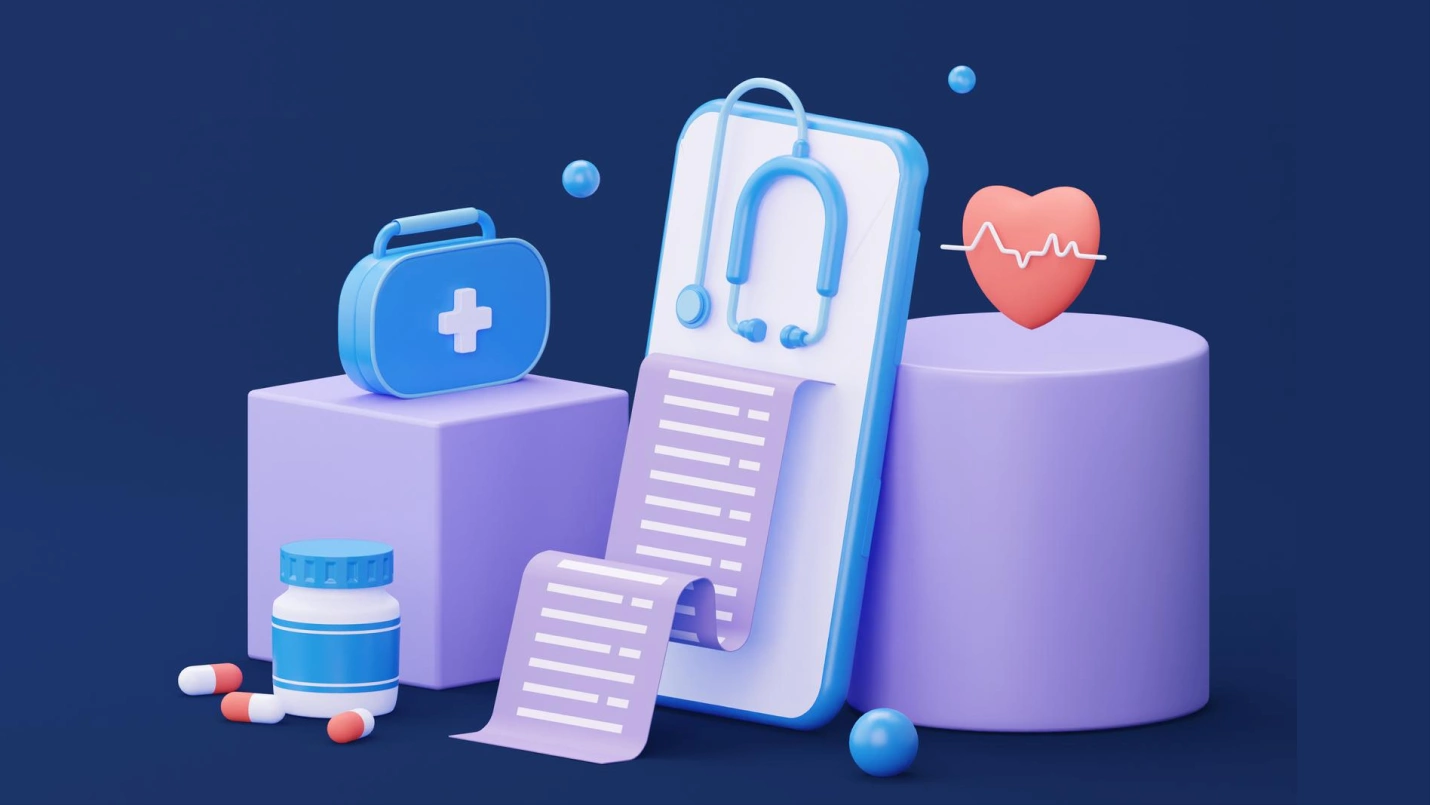The use of mobile technology to serve the health and wellness space is growing in leaps and bounds. With a current market size of over $40 billion, the Mobile Health (or mHealth) market is expected to reach $105.6 billion by 2030. In other words, if you’re considering entering this space and building your health app for iPhone and Android devices, there’s plenty of room for opportunity.
This is what data says, for example, about the mhealth market in the US,
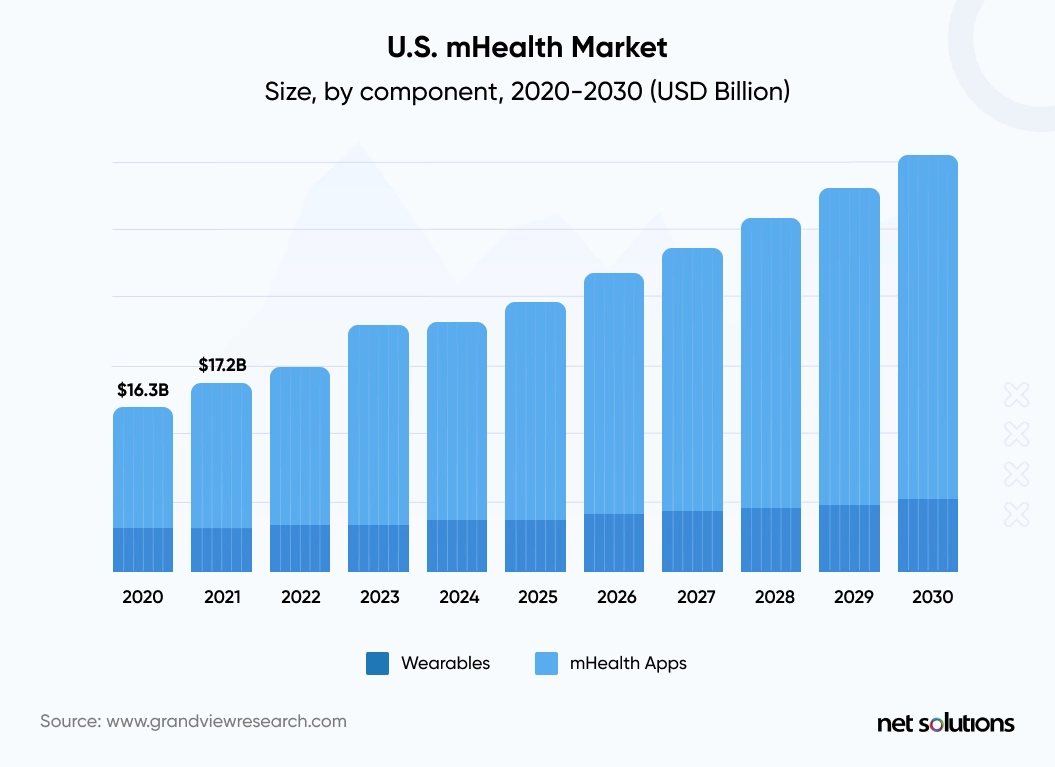
Of course, we advise anyone considering building an app to view the niche they want to serve. We also recommend researching the current market leaders to understand what they do well and how they’ve captured a significant market share.
Healthcare apps are increasingly used to manage mental health conditions and enhance general well-being by bringing about behavioral change and practicing mindfulness & meditation. These apps have vast potential since nearly 11% of the global population lives with mental health conditions.
In the wider sphere of mobile app development, healthcare has become a valued and special niche over time. Specifically, mental health app providers have pursued novel methods to make these apps more personalized and integrate socialization and network support. Healthcare providers can leverage apps to bring in better care. Treatment becomes available to a broader population, and healthcare is easier to manage.
Deloitte points out that “mental health apps can offer opportunities not only for app developers to monetize new and existing products and services but also for organizations worldwide to engage in corporate social responsibility efforts to increase well-being and improve access to care”
The Deloitte report on mental health apps states the following data:

With all this in mind, we’ve created this broad overview of some of the most successful health and wellness apps available today. We’ve also broken these 20 apps into 7 categories to show how these companies target specific niches within the broader mHealth sector.
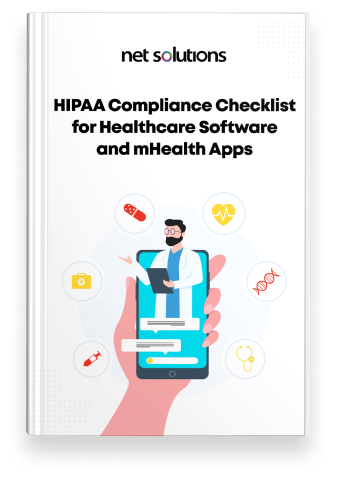
We respect your privacy. Your information is safe.
Telemedicine and Remote Patient Monitoring Apps
From patient appointment settings to virtual visits, telemedicine offers convenience, cost savings, and efficiency to providers and patients alike. Telemedicine gained popularity at the start of the Covid-19 pandemic, and now that we’re used to virtual appointments, they’re here to stay.
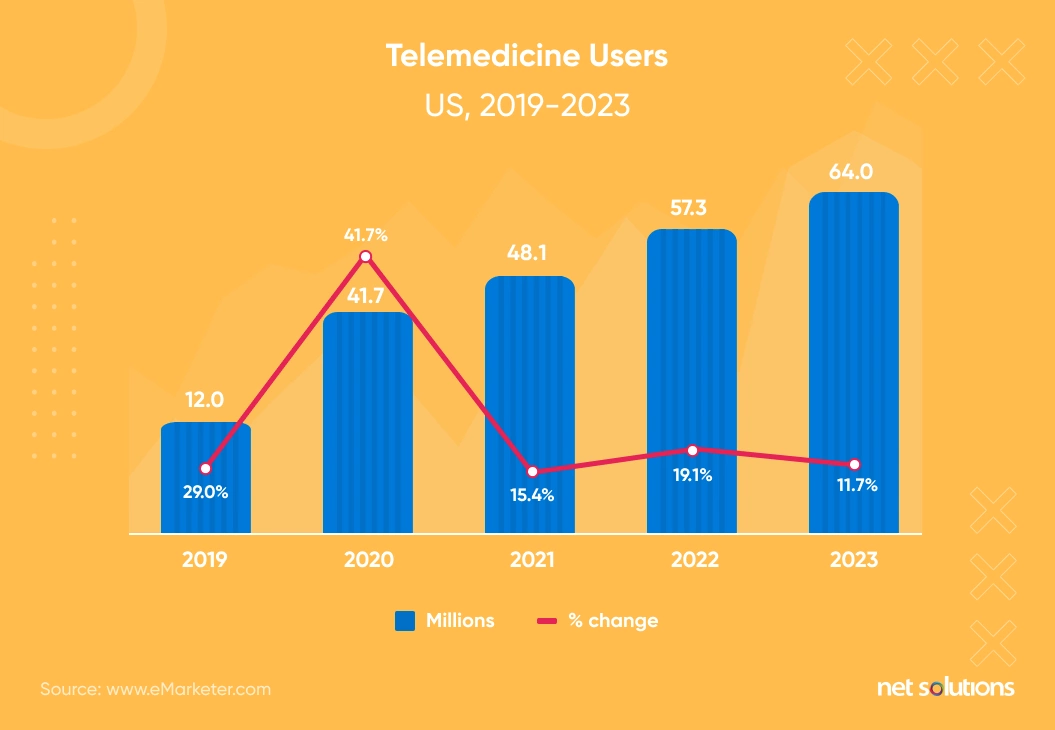
1. Teladoc
Teladoc is a leading telemedicine platform that connects patients to care providers across various disciplines, including General Practitioners, Dermatologists, Psychiatrists, and more. It works with multiple insurance plans, and patients don’t even need to wait for an appointment—Teladoc can connect patients to providers within minutes.
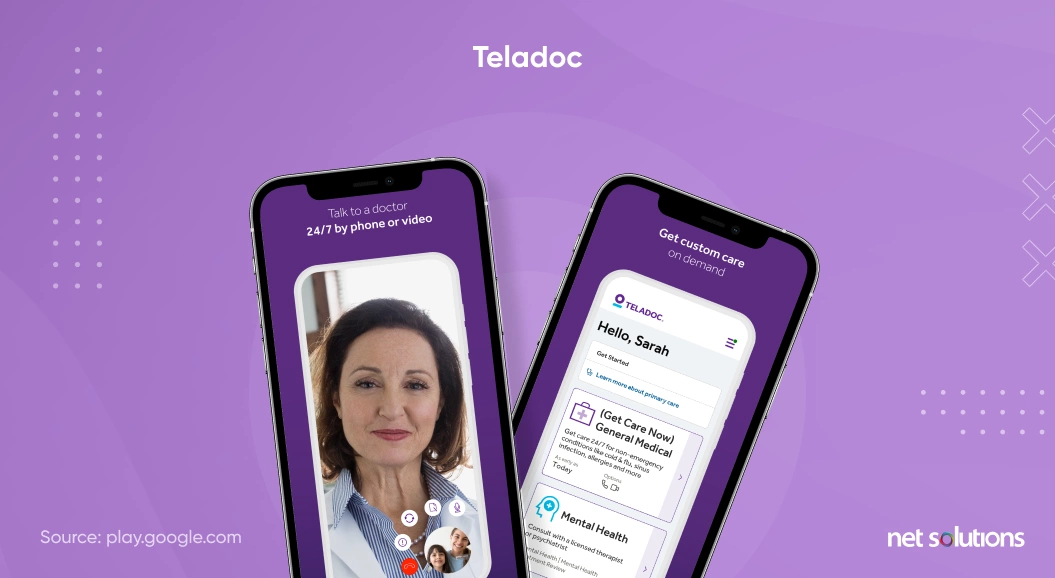
What makes the Teladoc app stand out?
Teladoc’s simple, straightforward design makes it easy to use. It even integrates with the iPhone. If they’re already set up in the system, all iPhone users have to do to start the process of finding a healthcare provider is to tell Siri: “I want to see a doctor.”
2. ZocDoc
ZocDoc allows patients to make appointments with participating physicians. So if a doctor is in the system, patients can easily find an open slot, book an appointment, fill out forms, identify insurance info, and do anything else they need to do to book a slot.
What makes the ZocDoc app stand out?
ZocDoc has a strong presence in healthcare, so many doctors use it. With so many participating physicians, it’s possible that someone can schedule all their appointments through ZocDoc. They also encourage repeat use by offering reminders for physicals and follow-ups.
3. Lemonaid
Lemonaid is a telehealth app headquartered in San Francisco that serves all 50 states in the U.S. Their mission is to provide affordable healthcare throughout the country, and they’ve created an app that makes it easy to connect with physicians across a variety of disciplines instantly.
What makes the Lemonaid app stand out?
Lemonaid has its pharmacy connected to the app, so when patients need medication, they can use Lemonaid’s convenient mail-order subscription (assuming they’re not requesting a controlled substance).
4. BetterHelp
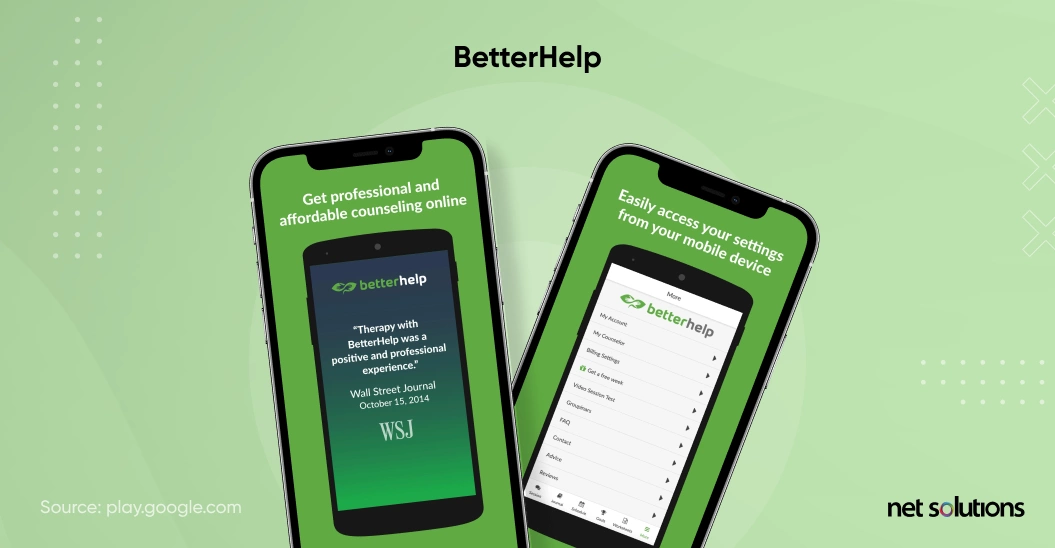
BetterHelp is the world’s largest online mental health app, providing individual and couples counseling. All providers are licensed therapists, and no contracts are required.
What makes the Betterhelp app stand out?
People want to connect with therapists in various ways, and BetterHelp provides this flexibility. They can conduct sessions via text, voice, or video chat. This unique approach helped them stand out in the field and become a market leader.
Prescription Ordering and Deliver Apps
Going to the pharmacy and waiting for a prescription to be filled is never a fun experience. Wait times can drag on longer than expected, and often a pharmacy doesn’t even have the medication that patients need—forcing them to return later. Prescription ordering and delivery apps have become popular because they simplify the process and save time.
5. Express Scripts
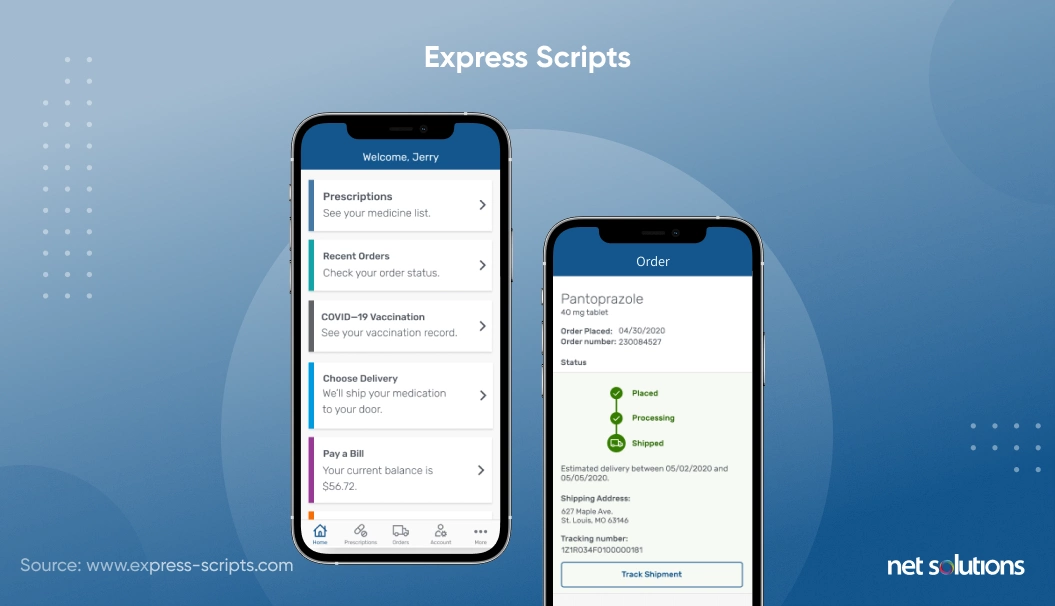
Express Scripts is a leading platform that allows patients to order scripts and receive at-home delivery throughout the United States. They also have onsite customer service available to answer questions 24 hours per day, every day of the week.
What makes the Express Scripts app stand out?
Express Scripts has created an extremely usable app, as evidenced by its 4.8-star rating on the Apple Store. Their customer service is also top-notch.
6. Blink Health
Blink Health is another online pharmacy with a user-friendly app and free delivery. They offer heavily discounted generic medications, which has earned them a large following.
What makes the Blink Health app stand out?
In addition to saving Americans money on medication (in a country where healthcare costs are higher), Blink Health customers are pleased with the platform’s customer service.
Mental Health and Self-help Apps
“When it comes to mental health, all countries are developing countries.”Psychiatrist and Harvard professor Shekhar Saxena
Demand for mental health services has risen over the past few years. Whether a result of economic insecurity, pandemic anxiety, or simply greater awareness and acceptance of mental health issues, people seek treatment like never before. And in the tech space, app builders are addressing this need in various forms.
Globally, medical professionals have increased their focus on offering good care to patients with mental illness. Look at what the statistics say:
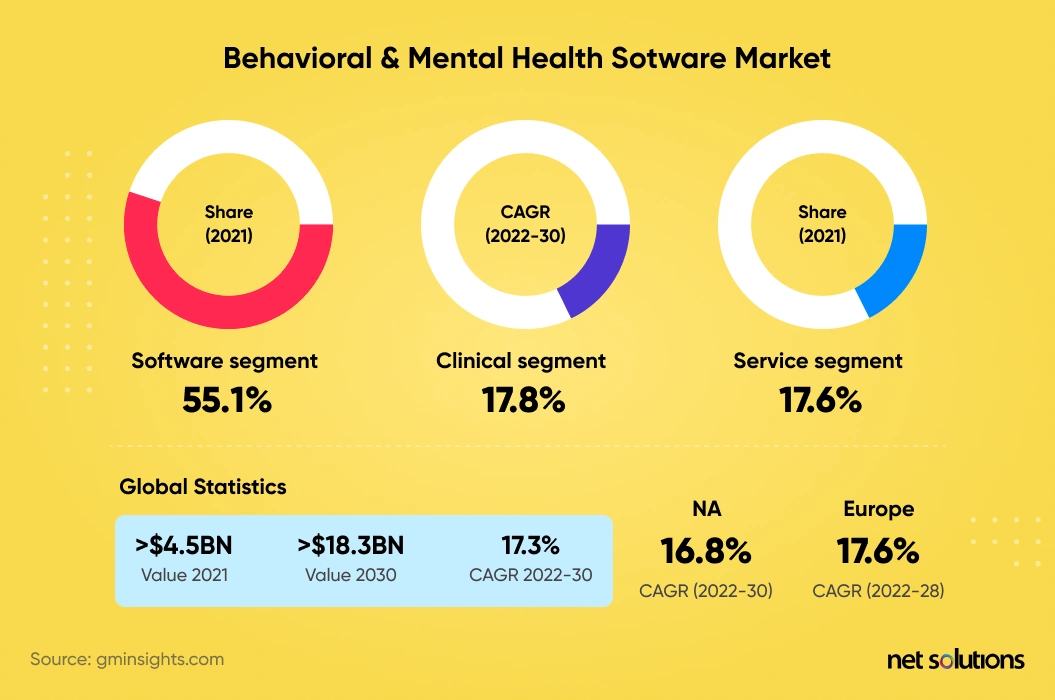
7. Talkspace
Talkspace is a telehealth platform that offers talk therapy and psychiatry, including mental evaluations and prescription services. It begins with an intake evaluation, and within 48 hours, Talkspace matches patients with a provider.
What makes the Talkspace app stand out?
Talkspace offers flexible plans with a flat monthly rate that provides providers with weekly therapy and text messaging.
8. Happify
Happify is a stress-reduction app based on Positive Psychology principles, which is all about optimizing well-being and finding joy in life. It provides psychological techniques and games to lift its users’ moods and reduce stress.
What makes the Happify app stand out?
Happify tracks and publishes its users’ stats surrounding their progress, and the data suggests some powerful results. According to the data on their website, 86% of Happify users show improvement in well-being after two months of using the app.
Medical Chart Tracking and Communication with Physicians
Technology makes it easier for patients to communicate directly with their healthcare providers from web portals and mobile apps. When physician’s offices adopt this technology, patients can efficiently ask questions, order prescription refills, access test results, and review medical records.
9. FollowMyHealth
FollowMyHealth is a straightforward app that allows patients to communicate with physicians, order prescriptions, and review test results.
What makes the FollowMyHealth app stand out?
FollowMyHealth has earned a 4.8-star rating on the iPhone App Store and a 4.7-star rating on Google Play. Users find it intuitive and easy to use.
10. MyChart
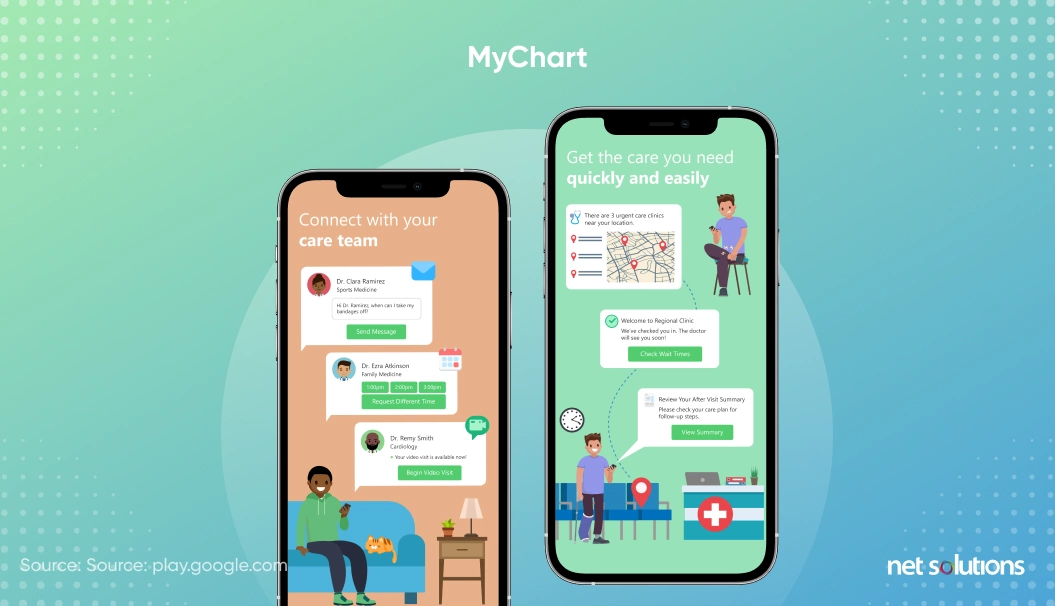
MyChart lets patients communicate with doctors, update paperwork and insurance, order prescription refills, share medical records, and plan health treatments.
What makes the MyChart app stand out?
MyChart is vast in its capabilities, which is why it’s been adopted by major U.S. hospitals like the Cleveland Clinic and other world leaders in healthcare.
11. Healow
Healow is a secure health and wellness records app that gives patients instant access to their medical records anytime, anywhere.
What makes the Healow app stand out?
In addition to medical records, Healow allows providers to connect with their patients through video chat and virtual appointments.
Fitness Apps
Many apps are designed to keep you healthy by tracking your food intake and exercise. These apps allow you to count calories, track macronutrients like carbohydrates, protein, and fat, and record exercise—from weights to cardio.
The pandemic has brought the demand for Fitness apps to the forefront. Consider the following:
The fitness app market increased by 48.8% from 2019 to 2020, and the market is expected to witness a y–o-y growth of 17.0-17.6% in the next 5 years. GrandViewResearch
By the way: If you’re considering launching a fitness app, look at our list of 2024’s top 10 fitness apps.
12. MyFitnessPal
MyFitnessPal is one of the most popular calorie-counting apps out there. The calorie-counting component is free. It offers advanced features for paid users interested in customizing things like their macronutrient intake (helpful for those doing low-carb diets or other diets that track more than just calories).
What makes the MyFitnessPal app stand out?
MyFitnessPal captured the social aspect of weight loss and fitness early on, offering forums where users could connect with others on a similar journey and share stats with friends.
13. Noom
Noom began as a calorie-counting app in 2008; it has since evolved into a much larger platform that includes options for dietary coaching with personalized health plans.
What makes the Noom app stand out?
In addition to customized plans and coaching, Noom takes a unique approach to diet by color-coding different foods and gamifying nutrition and weight loss.
14. MyPlate
MyPlate is a nutrition tracking app run by the United States Department of Agriculture (USDA). As such, it provides highly reliable information about foods from a trustworthy source—as opposed to the crowd-sourced data that some other apps use.
What makes the MyPlate app stand out?
MyPlate integrates the USDA’s standards for daily food intake, which are printed on every food label in the United States. People looking for a dedicated app will appreciate MyPlate.
15. Fitbit
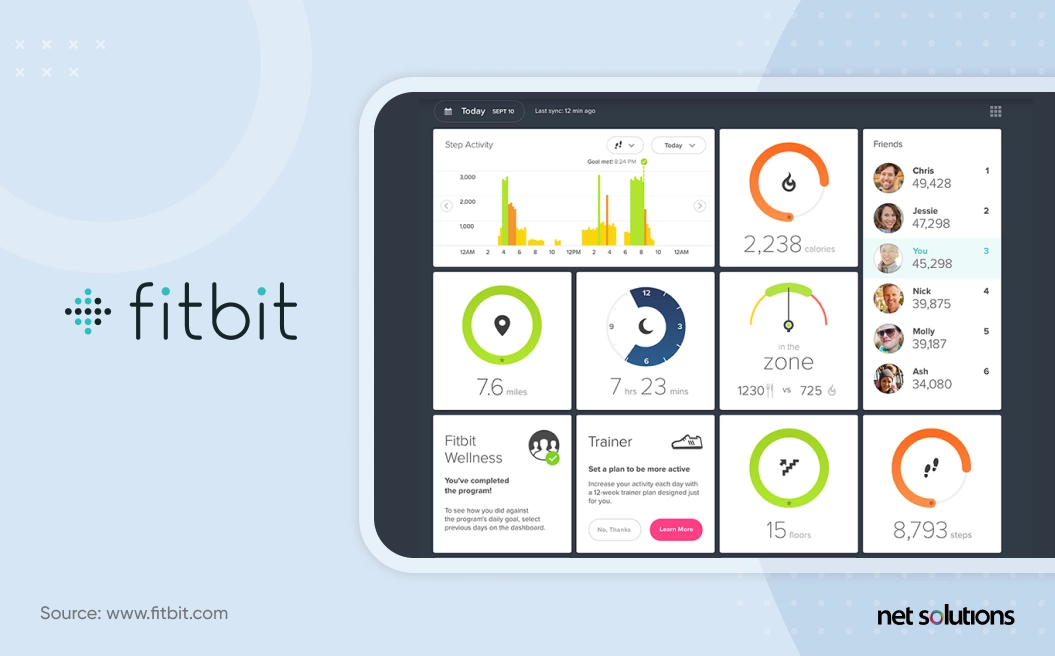
The Fitbit app offers a premium membership for those who want to gain greater insight into the data provided by their Fitbit smartwatches and trackers.
What makes the Fitbit app stand out?
The Fitbit platform is incredibly user-friendly. People remain loyal to Fitbit because they’ve genuinely nailed gamification—offering badges for things like walking the distance of the Great Wall of China since joining Fitbit (that’s 5,500 miles or 8,851 KM).
16. Fitness Coach
The Fitness Coach app is an at-home workout app that provides videos of exercises you can do anywhere and workout plans.
What makes the Fitness Coach app stand out?
Many users love that Fitness Coach breaks down each exercise into a bite-size description and demonstrations. Unlike a long video that users pause and rewind to keep up with, Fitness Coach allows them to master each exercise before moving on.
Mindfulness Apps
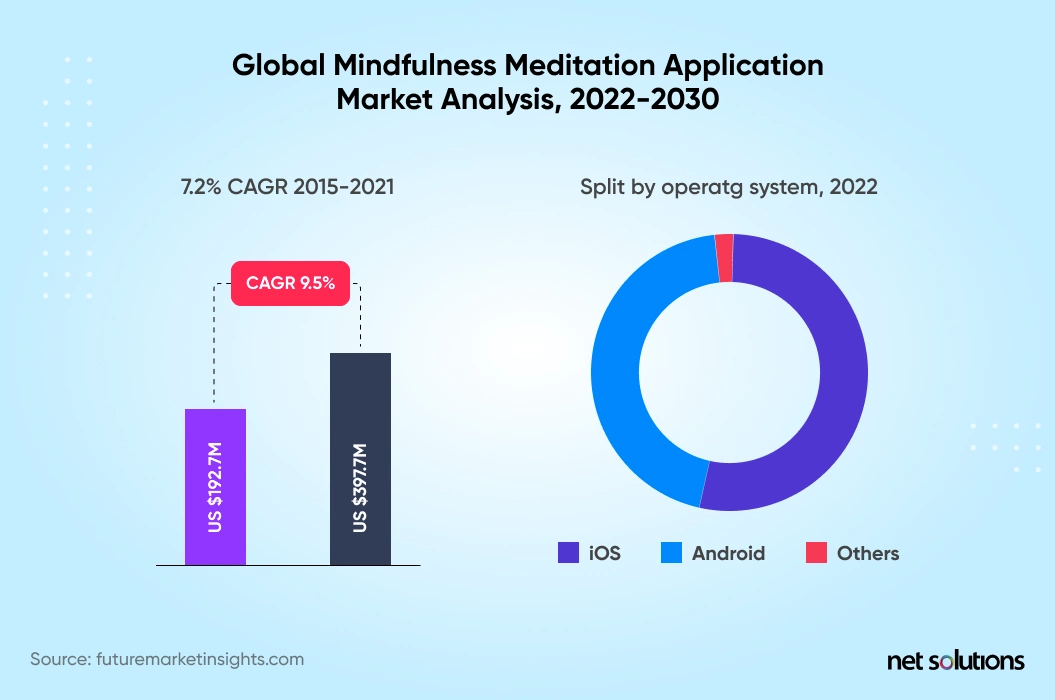
Mindfulness practices like meditation and yoga have been a gateway for optimal well-being and mental health for thousands of years in Asia, and they’ve gained real traction in the rest of the world over the past decade. Western medical science has repeatedly shown the efficacy of meditation and yoga in calming anxiety, treating depression, and helping people find a sense of inner peace. The following apps assist people in tapping into that state of centeredness and training their minds.
17. Headspace
Headspace is a meditation and mindfulness app that shows proven results from independent studies, demonstrating reduced anxiety and increased focus among its users.
What makes the Headspace app stand out?
Headspace is known for its easy-to-use interface, enjoyable narrations, and a large selection of meditations providing something for everyone. They even have child-friendly meditation sessions to introduce kids to mindfulness and meditation.
18. Calm
Calm is an award-winning meditation and mindfulness app that has received rave reviews from industry professionals and users. It offers guided meditation, sleep stories, breathing techniques, and more.
What makes the Calm app stand out?
Calm features courses from renowned leaders in meditation and narrations from celebrities like Matthew McConaughey, LeBron James, and Harry Styles. These familiar voices might seem like a novelty, but users like them and respond to them, helping the Calm app live up to its name.
Pregnancy & Motherhood Apps
Pregnancy and motherhood are hot topics online, with over 4.4 million mom blogs on the internet and countless resources for mothers seeking guidance at every stage—from conception onward. App developers have created helpful apps to serve this market, so we’ve decided to highlight two of the best (one for pregnancy, the other for motherhood, and parenting in general).
19. Pregnancy+
Pregnancy+ is a pregnancy tracking app that allows expecting mothers to stay on top of their fetus’s development, remember appointments, pack hospital bags, and track developmental milestones.
What makes the Pregnancy+ Tracker app stand out?
One thing that makes Pregnancy+ so engaging is that it offers 3D renderings of the developing fetus at different stages, and expectant mothers can visualize what’s happening in their wombs.
20. WeMoms
The WeMoms app connects women to a community of 15 million mothers and expectant mothers. They use the app to share a wide variety of information and thoughts about pregnancy and motherhood.
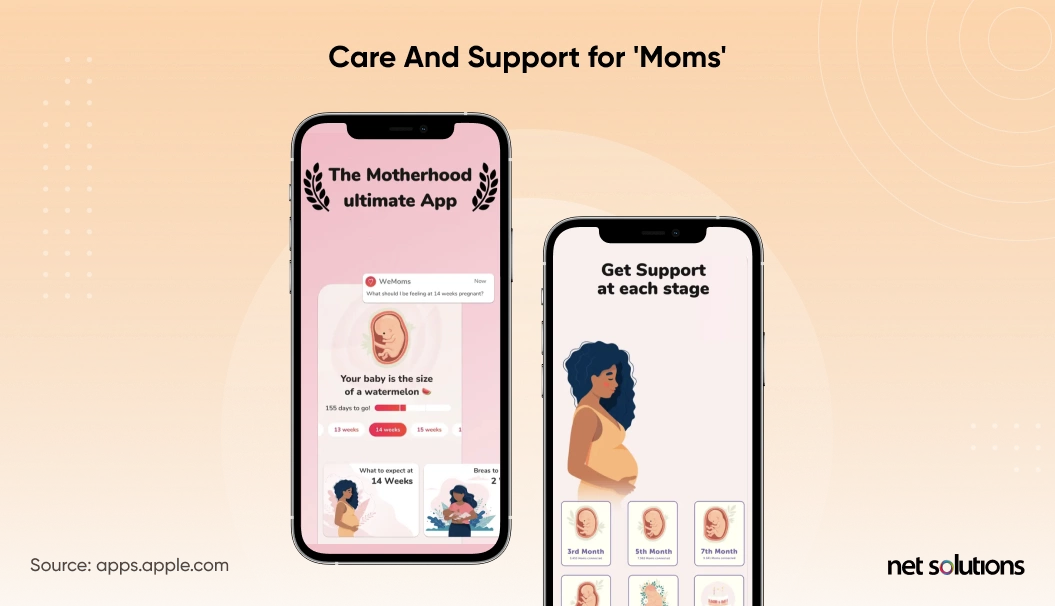
What makes the WeMoms app stand out?
WeMoms makes it easy for users to find the information they need and search through various topics, and the platform has done a fantastic job of cultivating community.
Learning from the Best Health and Wellness Apps
It was our list of the best health and wellness apps for iPhone and Android. You’ll notice that these apps zoomed in on specific market niches and did their best to bring some unique features to the table. As with all mobile app development services, it paves the way for success.
If you also have a health and wellness app idea, you must focus on building an app that brings something unique to the table. It is possible only with detailed market research, an in-depth understanding of your target audience, and a thoroughly planned development process based on continuous development, testing, and feedback. An outsourcing partner like Net Solutions can take care of these things. Contact us today!
Frequently Asked Questions
Healthcare apps offer medical doctors a unique opportunity to connect with their patients and respond to their needs quickly, keeping patients informed and giving them easy access to test results.
When patients can ask quick questions through a web portal or an app, they’re more likely to engage their doctors and request the information they need to lead a healthy life. Also, this communication builds trust between doctors and patients, increasing patient loyalty.
Telehealth describes the broad category of remote medical treatment tools, techniques, and practices, and it includes mHealth, which is short for Mobile Health. The field of mHealth includes apps that patients use to connect and communicate with physicians.
A few examples of mHealth include apps that allow patients to book medical appointments via smartphone or other mobile devices review medical records, request prescription refills, etc.
Recent studies suggest that some mental health apps can be as effective as therapy when treating depression and anxiety at a much lower cost. They also have the added benefit of reaching people in rural and remote locations, where those suffering from mental health conditions have far less access to mental health services than their urban-dwelling counterparts.

